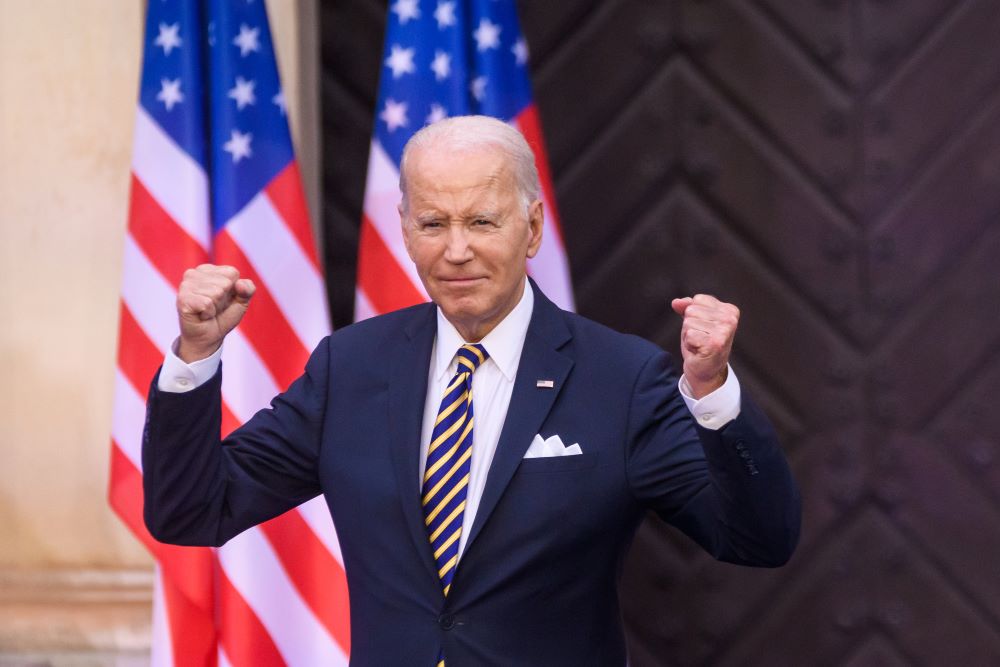In a significant political development, a group of House Democrats has issued a joint statement urging President Joe Biden to withdraw from the 2024 presidential race. This call for Biden to step aside comes amid growing concerns about his age, performance, and ability to secure a victory against former President Donald Trump in the upcoming election.
Key Figures and Growing Pressure
The statement was signed by 28 Democratic members of Congress, including Representatives Jared Huffman, Marc Veasey, Chuy Garcia, and Mark Pocan. These lawmakers expressed serious concerns about Biden’s age and cognitive abilities, advocating for a transition to a new generation of Democratic leaders.
The call for Biden to drop out has been echoed by other prominent figures, including Representatives Sean Casten, Jim Costa, and Adam Schiff, as well as Senators Jon Tester and Peter Welch.
The pressure on Biden to reconsider his candidacy has been building from multiple fronts:
- Political Figures: High-profile Democrats like former President Barack Obama have reportedly conveyed to their allies that Biden’s path to victory has greatly diminished. Senate Majority Leader Chuck Schumer and House Minority Leader Hakeem Jeffries have also had private conversations with Biden, urging him to step aside.
- Celebrities and Donors: Prominent personalities such as George Clooney, Rob Reiner, and Stephen King have criticized Biden’s decision to stay in the race. Influential donors like Mark Pincus and media figures like Joe Scarborough have also joined the chorus calling for Biden to exit.
- Public Sentiment: Recent polls indicate that nearly two-thirds of Democrats want Biden to withdraw from the race, reflecting widespread concerns about his viability as a candidate.
Biden’s Response and Internal Dynamics
Despite the mounting pressure, Biden has publicly resisted calls to end his campaign, attributing his lackluster debate performance to a cold and a hectic travel schedule.
However, reports suggest that Biden has become more receptive to arguments about stepping aside, with some top Democrats anticipating his withdrawal imminently.
Biden’s recent COVID-19 diagnosis has further complicated the situation, sidelining him from the campaign trail during a critical period. The diagnosis has raised questions about his ability to continue his campaign effectively, with some analysts suggesting it could serve as a plausible justification for his withdrawal.
Approval Ratings and Electoral Prospects
President Biden’s approval ratings have been a significant factor in the growing calls for his withdrawal. According to recent data, Biden’s approval rating stands at 37.0% as of July 16, 2024. This low approval rating has raised concerns among Democrats about Biden’s electability in the general election.In hypothetical matchups, former President Donald Trump leads Biden by a narrow margin. A recent poll shows Trump with 43% support compared to Biden’s 42%, with 6% supporting Robert F. Kennedy Jr.. This tight race has intensified worries within the Democratic Party about Biden’s ability to secure victory in November.
Potential Alternatives and Future Scenarios
As the Democratic Party grapples with the possibility of Biden stepping aside, discussions about potential alternative candidates have intensified. Vice President Kamala Harris is often mentioned as a possible successor, though Biden has reportedly expressed doubts about her ability to win against Trump.
Other potential contenders include prominent Democratic figures who have remained publicly supportive of Biden but may be preparing for a possible shift in the party’s candidate lineup.
Some analysts suggest that a younger, more vigorous candidate could revitalize the Democratic base and potentially bring key issues like abortion rights to the forefront of the campaign. Names like Michigan Governor Gretchen Whitmer have been floated as potential alternatives who could energize the party and appeal to a broader electorate.
Impact on Party Unity and Campaign Strategy
The growing dissent within the Democratic Party poses a significant challenge to party unity as the national convention in Chicago approaches. The internal debate over Biden’s candidacy risks fracturing the party at a crucial time when a united front is essential for electoral success.Campaign officials are closely monitoring polling data and public sentiment, aware that unfavorable numbers could further exacerbate the situation. The Biden campaign faces the daunting task of not only addressing concerns about the president’s age and performance but also reinvigorating a base that appears increasingly skeptical of his ability to lead the party to victory.
Critical Timeframe and Next Steps
Political analysts suggest that Biden has a limited window to salvage his candidacy. His upcoming public engagements, including media interviews and campaign events, are seen as critical opportunities to reshape public perception and demonstrate his fitness for office.The president’s inner circle emphasizes his determination to fight for reelection while acknowledging the importance of his imminent appearances. Biden is actively engaging with Democratic leaders and seeking counsel from trusted individuals as he navigates this pivotal moment in his political career.
Conclusion
The joint statement from House Democrats urging President Biden to drop out of the 2024 presidential race marks a critical moment in the Democratic Party’s internal dynamics. As Biden faces increasing isolation and pressure from various quarters, the future of his campaign remains uncertain. The coming days and weeks will be crucial in determining whether Biden will heed the calls to step aside and what impact this will have on the Democratic Party’s strategy for the upcoming election.The situation remains fluid, with potential for significant shifts in the political landscape. As the Democratic Party grapples with these challenges, the outcome of this internal debate will likely have far-reaching consequences for the party’s prospects in the 2024 presidential election and beyond.
